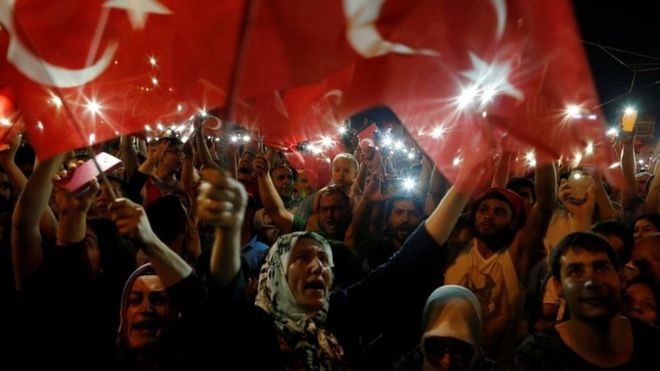Turkish crowds rally to democracy calls after coup attempt

Large crowds have gathered in Istanbul and other cities after calls by Turkish authorities to defend democracy following the failed military coup.
Less than 24 hours earlier thousands had turned out to help quash the plot.
President Recep Tayyip Erdogan wants the extradition of US-based cleric Fethullah Gulen over the plot. Mr Gulen denies any involvement.
Nearly 3,000 soldiers have been detained and some 2,700 judges sacked as the government re-asserts power.
Generals are reported to be among those detained.
Prime Minister Binali Yildirim called the coup attempt a "black stain on Turkish democracy".
Explosions and firing were heard in key cities on Friday night. Official figures put the number of civilians and police killed at 161, while 104 soldiers involved in the coup also died. The number of injured was 1,440.
US Secretary of State John Kerry urged the Turkish authorities to respect the rule of law during their investigations into the coup attempt.
President Recep Tayyip Erdogan has called on US President Barack Obama to extradite a US-based Turkish cleric, Fethullah Gulen, whom he accuses of being behind the plot.
Mr Gulen has denied this and the US has said that Turkey must prove the allegation before his extradition could be considered.
Meanwhile, the US has advised its citizens against any travel to Turkey.
"Foreign and US tourists have been explicitly targeted by international and indigenous terrorist organisations," warned a statement from the US State Department.
Why did coup happen? — Jeremy Bowen, BBC News Middle East Editor
The attempted coup happened because Turkey is deeply divided over President Recep Tayyip Erdogan's project to transform the country and because of the contagion of violence from the war in Syria.
President Erdogan and his AK Party have become experts at winning elections, but there have always been doubts about his long-term commitment to democracy. He is a political Islamist who has rejected modern Turkey's secular heritage. Mr Erdogan has become increasingly authoritarian and is trying to turn himself into a strong executive president.
From the beginning Mr Erdogan's government has been deeply involved in the war in Syria, backing Islamist opposition to President Assad. But violence has spread across the border, helping to reignite the fight with the Kurdish PKK, and making Turkey a target for the jihadists who call themselves Islamic State.
That has caused a lot of disquiet. Turkey has faced increasing turmoil and the attempt to overthrow President Erdogan will not be the last of it.
What is happening now?
Prime Minister Yildirim said the situation was now "completely under control" and the government's commanders were now back in charge.
Earlier, acting military chief of staff Umit Dundar said officers from the air force, the military police and armoured units had mainly been involved in the coup attempt.
Although the chief of staff had been rescued, several military commanders were still being held hostage, he said.
Turkish Foreign Minister Mevlut Cavusoglu said on Twitter that eight soldiers who flew to Greece in a helicopter to seek asylum will be extradited. Greece has not yet formally confirmed the move.
A US government spokesman said the Turkish government has closed its airspace to military aircraft, and as a result operations from Incirlik Air Base against the so-called Islamic State had been halted.
Earlier, some 200 unarmed soldiers left Turkey's military headquarters in Ankara and surrendered to police, according to the state-run Anadolu news agency.
Dramatic images showed dozens of soldiers walking away from their tanks with their hands up on one of Istanbul's Bosphorus bridges.
Events began on Friday evening as tanks took up positions on two of the bridges over the Bosphorus Strait in Istanbul, blocking traffic. Troops were seen on the streets and low-flying military jets were filmed over Ankara.
An army faction then issued a statement that a "peace council" was running Turkey and had launched the coup "to ensure and restore constitutional order, democracy, human rights and freedoms".
During the violence, the Turkish parliament and presidential buildings in Ankara were attacked. Gunfire was also heard outside Istanbul police headquarters and tanks were said to be stationed outside Istanbul airport.
There were reports of fierce clashes in Taksim Square and gunfire and explosions were heard near the square. One of the helicopters being flown by rebels was reportedly shot down by government troops in Ankara.
President Erdogan, then in the south-west resort of Marmaris, made a televised address via his mobile phone, urging people to take to the streets to oppose the uprising.
After flying to Istanbul, Mr Erdogan said: "What is being perpetrated is a treason and a rebellion. They will pay a heavy price."
Политика конфиденциальности | Правила пользования сайтом








